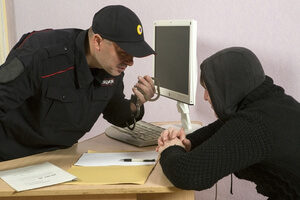 In this land of opportunity, adulthood begins at eighteen. At eighteen, you gain your full rights and responsibilities. You are legally able to vote, sign contracts, marry, and even die for your country. Though you cannot drink alcohol, you can make decisions that will seriously impact your future because you are deemed competent enough to navigate the world as adults. Yet, when it comes to criminal matters, the system often unfairly punishes minors for serious crimes, sometimes treating them as adults.
In this land of opportunity, adulthood begins at eighteen. At eighteen, you gain your full rights and responsibilities. You are legally able to vote, sign contracts, marry, and even die for your country. Though you cannot drink alcohol, you can make decisions that will seriously impact your future because you are deemed competent enough to navigate the world as adults. Yet, when it comes to criminal matters, the system often unfairly punishes minors for serious crimes, sometimes treating them as adults.
Though you often consider children to be innocent, their innocence does not preclude violence. There are countless stories of children who have shot their parents, siblings, friends, or others upon discovering an unattended loaded gun in the home. Juveniles are fully capable of committing violent acts, but they generally do not understand the implications of their actions. Today, the juvenile justice system continues to struggle with ensuring that juveniles learn their lessons while not being overly harsh on them.
When Minors Commit Violence, the Juvenile Justice System Faces Tough Decisions
It wasn’t long ago in Jacksonville, Florida that a 12-year-old was arrested on manslaughter charges for firing a gun at a 12-year-old girl who was attending a sleepover. The boy, then 11, discovered the loaded gun under the house and ran inside. He aimed at everyone in the room before he set his eye on her. A brief interchange of dialogue occurred before he shot the gun, striking her in the ear. The girl died the next month.
Although many believe the boy should be held accountable for this tragedy, this shooting was preventable. The homeowners could have followed basic gun safety rules, such as securing the unloaded shotgun in a locked safe and keeping the ammunition in another protected storage compartment. Though Jacksonville prosecutors have charged the boy with manslaughter, it was unclear whether the adults would be held accountable for their negligence. While Florida is one of the twenty-eight states with child access prevention laws (CAP), which hold adults responsible for carelessly stored firearms, in the majority of cases prosecutors are hesitant to press charges against individuals who are grieving.
Scientific studies show that your brain doesn’t fully develop until your early to mid-twenties. In particular, the region responsible for planning and executing good judgment takes the longest to mature. Teens, regardless of their intelligence, can be expected to make poor choices. While adults think with the prefrontal cortex (the part responsible for logic and reason), teens process information with the amygdala (the emotional part). They are often unaware of the long-term consequences of their actions, which puts prosecutors in a difficult position.
Charging a 12-Year-Old with Manslaughter
It took several days to charge the young suspect in this case. There was a full investigation to confirm that he was responsible for the death of the 12-year-old girl. Chief Assistant State Attorney L.E. Hutton provided insight on how they handle such cases.
“We thoroughly review the facts and evidence of the case, take into account the juvenile’s age, and receive input from victims and law enforcement. We also try to learn as much as possible about the juvenile, which includes obtaining medical, psychological, Florida Department of Children and Families, and school records.”
Ultimately, though the boy may not understand the full ramifications of his actions, he faces heavy charges for a serious violent crime that will impact the rest of his life. The Florida Department of Juvenile Justice is overseeing this particular case. Florida is one of thirty-two states that has no restrictions on the minimum age for delinquency, meaning that very young children can get wrapped up in the justice system, even though they have no understanding of court proceedings.
If you have a juvenile facing charges for a violent crime, don’t hesitate to seek the counsel of a veteran criminal defense attorney in West Palm Beach. Attorney Brian Gabriel has worked with juveniles and adults for over 30 years, securing their rights and protecting their interests at each step of the legal process. Call 561-622-5575 or contact Mr. Gabriel online.


